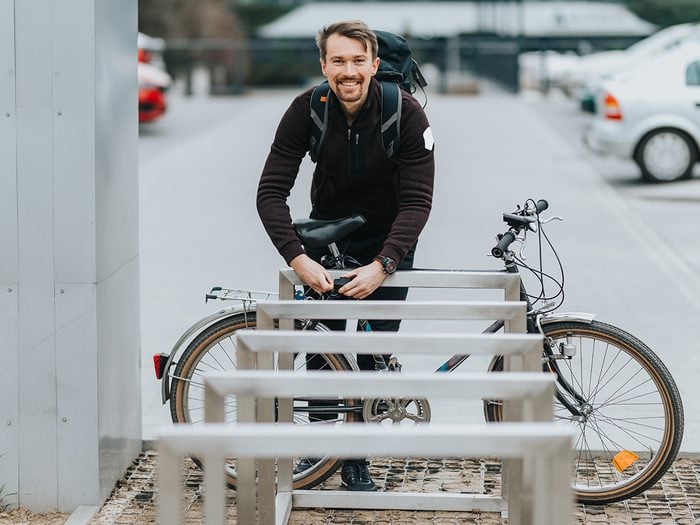
Bike security best practices
Thousands of bikes are reported stolen each year. Don’t let yours be next. A little extra care, along with the locks and solutions recommended below, can help ensure yours stays safe.
- Pick a smart lock spot. Ideally it will be anchored to the ground and hard to tamper with.
- Don’t count on cameras or crowds. The former don’t typically help once the thief has succeeded, and the latter can actually help detract attention from a theft-in-progress.
- Don’t forget the frame. Secure the frame, not just the front or rear wheel. Many bikes have quick-release levers attaching the wheel to the frame, allowing a thief to swipe the bike with a flick of the thumb.
- Lock high. As high up on the bike as you can. If the cable, chain or U-lock is on the ground, it’s easier for a prepared thief to use an angle grinder or bolt cutters, with the ground as extra leverage.
Every editorial product is independently selected, though we may be compensated or receive an affiliate commission if you buy something through our links.
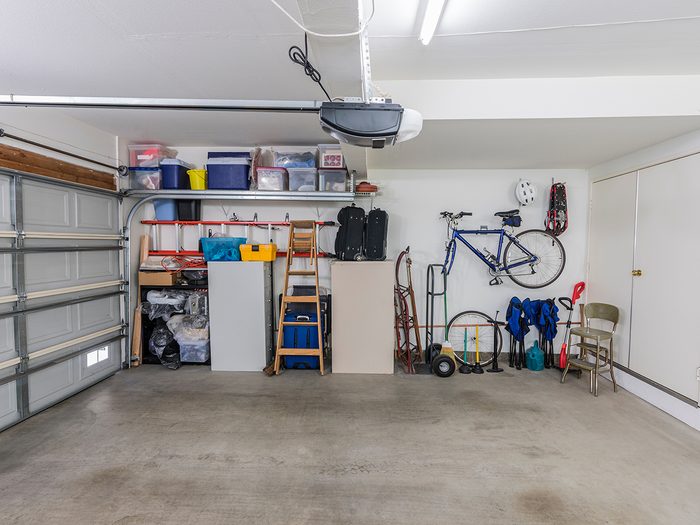
Secure multiple bikes in your garage
I know too many people who’ve had their expensive bikes stolen from their garages in the middle of the night. Unfortunately, thieves see opportunity in short windows of time during daylight hours, too.
To add an extra level of security inside your garage, screw heavy-duty eye bolts into the wall studs, at least one for every two bikes. Thread a braided steel cable, like the seven-foot Kryptonite Kryptoflex 710 double loop cable or the 30-foot BV security steel cable, through each bike’s frame and the eye bolts. Make sure the cable is long enough to double back around to connect to a sturdy lock.
If those cables are too short for your needs, you may need to create your own with the standard braided steel cable you can buy at most hardware stores. Use cable clamps on both ends to create the needed lock loops.
One additional word of warning: Don’t inadvertently help would-be thieves by leaving your bolt cutters, angle grinders or other cutting instruments in plain view.
Here’s what you need to know about smartphone security.
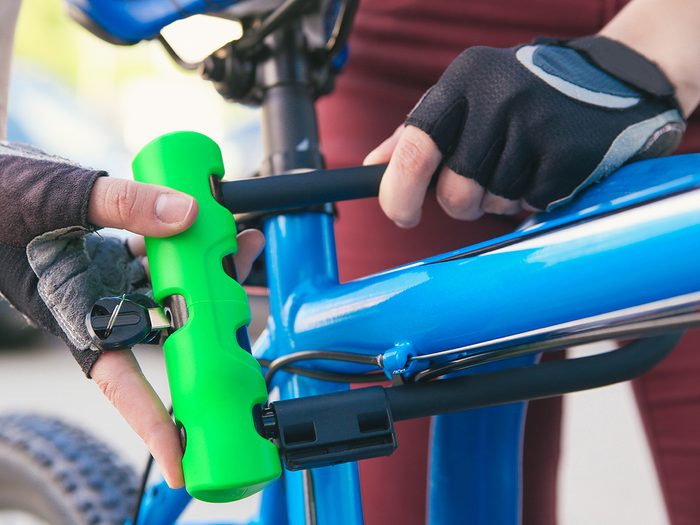
Find the right lock
The best lock is the one you always carry with you. Consider your riding habits, personal preferences and the bike you want to keep safe when choosing yours. A few top choices for different setups and riding styles:
Foldable lock
One of the more elegant, streamlined security solutions on the market, the FoldyLock Classic attaches to your bike via the bottle-cage mount. Just roll your bike up to the rack, unravel the 37-inch hardened-steel arms, and secure them to the rack with a key. It’s only about three pounds. However, I’d consider most folding locks a mid-range security option for short day use only.
Heavy-duty lock
If you’re a bike commuter who prioritizes safety, consider the Hiplok Gold chain lock. Worn around your waist while pedaling (it fits 28- through 44-inch waists), it boasts a 10-millimeter chain and 12-millimeter shackle that will resist all but the most powerful bolt cutters.
A pick-resistant cylinder in the lock foils thieves who rely more on finesse. The Hiplok’s greatest strength—its heftiness—is also its biggest weakness. At five pounds, some cyclists don’t like the way it feels while they pedal. But if you’re serious about keeping your bike secure, you won’t do much better than this.
Learn the six ways to outsmart porch pirates.
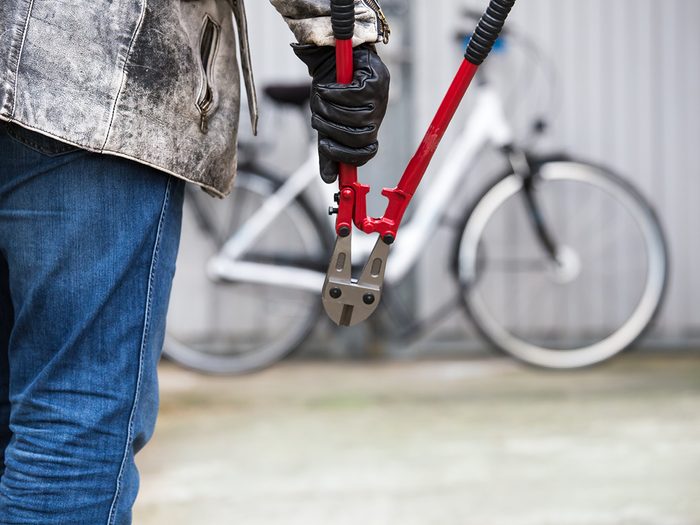
Employ a bike alarm
For yet another crime deterrent at home or parked outside, consider a bike alarm. Purchase a stand-alone alarm, like this WSDCAM alarm, or a lock with a built-in alarm. Amazon has dozens of options, and your local bike shop could be a good resource as well.
If a would-be thief jostles your bike, a 100 decibel claxon—about equivalent to a car alarm—sounds. The added attention should be enough to send most thieves running. An Abus U-lock on its own would be enough to deter most would-be thieves. Add the alarm, and it’s one of our most highly recommended options.
Don’t miss the 11 home security mistakes that put you at risk.
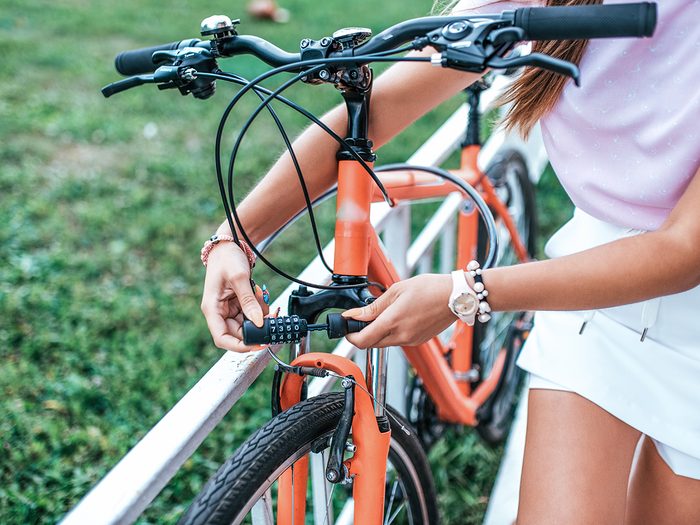
Use multiple locks, chains and cables locks
There will likely be instances where one lock won’t do, like when parking overnight, or if your primary lock isn’t large enough to reach your bike frame. Pairing a U lock with a chain will provide two layers of security, a challenge most thieves aren’t up for.
I’ve doubled up with a chain and a cable in the past: A heavy Kryptonite chain wrapped around the bike frame and rack, secured with a keyed lock, plus a secondary cable securing the wheels.
Check out these eight car anti-theft devices to protect your ride.
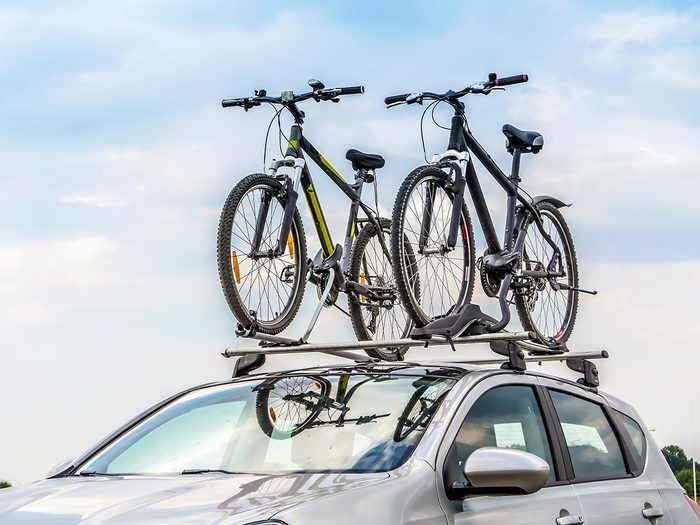
Fortify your travel rack
I travel with my bikes quite a bit and often worry about them being stolen off the back of my camper van. Even though my Küat rack has cable locks to secure the bikes, I don’t rely on them as a primary deterrent when overnighting in a heavily trafficked area.
I make my bike rack more secure two ways. I’ll use a secondary chain and lock, securing it to my rack (which is also locked onto my hitch). Or, if I’m camping, I’ll cover the bikes with a tarp secured by multiple bungee cords, connected in as many weird and unexpected ways as possible.
I’m betting the would-be thief will be annoyed and decide it’s not worth the effort. If not, the commotion will hopefully be enough to wake me. It’s a hassle, but it beats the alternative.
Here are 11 things you should never keep in your glove compartment.
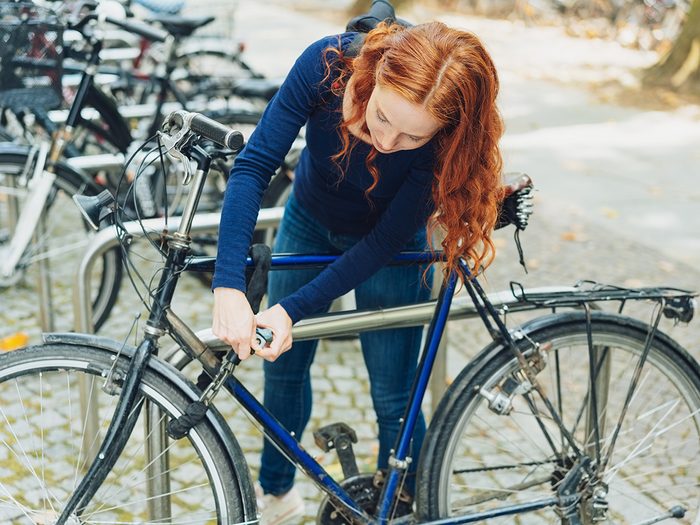
Don’t create an easy target
We’ve all be there. You’re out for a ride and either forgot your lock or chose not to bring one. Then you make a stop, whether a quick bathroom break or extended patio time. Your bike will be OK for a bit, right? We say, don’t take the chance.
Defense number one: A small, lightweight bike lock such as the Ottolock cinch lock. It weighs next to nothing—the smallest, 18-inch version weighs less than 1/3 pound—and fits easily in a jersey pocket. (If forgetfulness is your issue, keep it clipped to your frame.) It’s far from the most secure lock, but the band—three layers of stainless steel wrapped in Kevlar—should protect your bike long enough for you to run into the coffee shop.
I typically use lightweight locks when riding my most expensive bikes. (Riding with a five-pound lock and chain kind of negates the benefit of riding a sub-20-pound road bike.) But because the Ottolock and its ilk are less secure, I take more precautions when enjoying a post-ride beer with my riding pals at a local brewery.
To begin with, I always keep my locked bike within view. I typically ask for a seat outside as close to my bike as possible. If I’m feeling particularly nervous, I’ll remove the front thru-axle or quick-release skewer. This way if someone does try to grab my bike and pedal off, the front wheel will quickly slide out of the frame.
Read about how the least bike friendly city in Canada is becoming a cyclist’s dream.
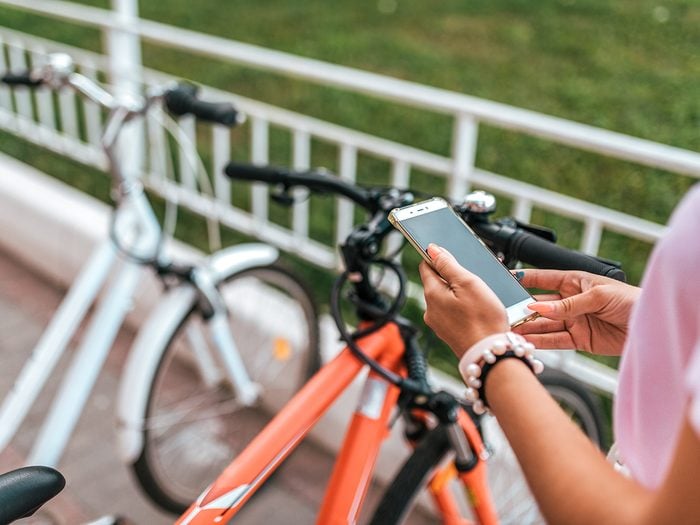
Get your bike back
On average, only five percent of all stolen bikes are returned to their rightful owner. I’m still mourning the loss of my Specialized Stumpjumper that was nicked more than a decade ago. Here are two ways to increase the chances of your bike being recovered:
Register it
When you buy a bike, log its serial number into the Bike Index database. If it’s stolen, you can alert your local bike community. If someone encounters the bike and lets you know, you have the proof you need to get it returned. According to the site, it’s recovered nearly $16 million worth of bicycles.
Invest in a GPS bike tracker
Sherlock may be the best known brand, but you can find other trackers and services on Amazon and elsewhere. When using Sherlock, insert the tracking device in your handlebar. If it’s stolen, use the app to track it within about 16 feet. Just remember to keep it charged. Expect to pay a monthly fee after the first two years of included service.
Next, check out the best bike trail in every province.